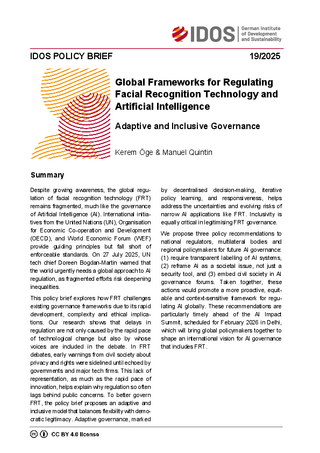Global frameworks for regulating facial recognition technology and artificial intelligence: adaptive and inclusive governance
Öge, Kerem / Manuel QuintinPolicy Brief (19/2025)
Bonn: German Institute of Development and Sustainability (IDOS)
DOI: https://doi.org/10.23661/ipb19.2025
Despite growing awareness, the global regulation of facial recognition technology (FRT) remains fragmented, much like the governance of Artificial Intelligence (AI). International initiatives from the United Nations (UN), Organisation for Economic Co-operation and Development (OECD), and World Economic Forum (WEF) provide guiding principles but fall short of enforceable standards. On 27 July 2025, UN tech chief Doreen Bogdan-Martin warned that the world urgently needs a global approach to AI regulation, as fragmented efforts risk deepening inequalities.
This policy brief explores how FRT challenges existing governance frameworks due to its rapid development, complexity and ethical implications. Our research shows that delays in regulation are not only caused by the rapid pace of technological change but also by whose voices are included in the debate. In FRT debates, early warnings from civil society about privacy and rights were sidelined until echoed by governments and major tech firms. This lack of representation, as much as the rapid pace of innovation, helps explain why regulation so often lags behind public concerns. To better govern FRT, the policy brief proposes an adaptive and inclusive model that balances flexibility with democratic legitimacy. Adaptive governance, marked
by decentralised decision-making, iterative policy learning, and responsiveness, helps address the uncertainties and evolving risks of narrow AI applications like FRT. Inclusivity is equally critical in legitimising FRT governance.
We propose three policy recommendations to national regulators, multilateral bodies and regional policymakers for future AI governance: (1) require transparent labelling of AI systems,
(2) reframe AI as a societal issue, not just a security tool, and (3) embed civil society in AI governance forums. Taken together, these actions would promote a more proactive, equitable and context-sensitive framework for regulating AI globally. These recommendations are particularly timely ahead of the AI Impact Summit, scheduled for February 2026 in Delhi, which will bring global policymakers together to shape an international vision for AI governance that includes FRT.
Dr. Kerem Öge is Assistant Professor in the Department of Politics and International Studies at the University of Warwick, United Kingdom.
Manuel Quintin is a PhD Candidate in the Department of Political Science at Université Laval, Quebec, Canada.

